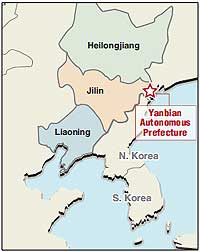China’s crackdown on defectors driven by separatism fears
 China’s deep-seated concerns regarding the separatist movement of ethnic minority groups is seen as the key reason behind a recent crackdown on immigrants in the Yanbian Autonomous Prefecture. The northeastern city is home to the largest number of ethnic Koreans in China.
China’s deep-seated concerns regarding the separatist movement of ethnic minority groups is seen as the key reason behind a recent crackdown on immigrants in the Yanbian Autonomous Prefecture. The northeastern city is home to the largest number of ethnic Koreans in China.
“Separatist protests by Tibetans and Uyghurs in Xinjiang, the western province of the country, have long been a headache to the Chinese government,” said Chun Ki-won, a pastor at the Seoul-based Christian organization Durihana Mission.
In August 2002, Chun was deported from China after serving a seven-month jail term for “being a threat to national security” after helping numerous North Koreans escape to a third country.
“Considering that China is grappling with separatist movements, it’ll be reasonable to conclude that it feels increasingly uneasy about the influx of the Korean population in the northeastern city of Yanbian, the largest Korean community there,” the pastor said.
Immigrant-bashing has risen in the Yanbian Autonomous Prefecture, the preferred destination of North Korean refugees.
On Friday, the state-controlled China Daily newspaper reported that China has launched a crackdown on illegal immigrants in Yanbian. “Foreigners who illegally enter, work, and overstay are hidden problems and they might pose potential threats to social stability,” a Yanbian police official was quoted as saying by the paper.
Thousands of ethnic Korean missionaries and human rights workers reportedly stay in Yanbian to help North Koreans. Some of them are South Korean nationals, while the majority is made up of ethnic Koreans born and raised in western countries, like the United States and Britain.
Nearly 800,000 Korean-Chinese people reside in Yanbian and the Korean language is widely used.
It is the preferred destination for North Korean refugees mainly because of its vicinity and the 522-kilometer narrow and shallow Tumen River dividing China and North Korea makes it feasible for them to cross the border.
In the mid-1990s when famine hit the North, some 300,000 North Koreans crossed the border with China for food and freedom, primarily in Yanbian.
Chun said China could have calculated the influx of North Koreans and South Korean activists in the Chinese-Korean community could lead to social instability leading to calls for separation, a worst-case scenario for China.
Recently self-immolation by several Buddhist monks and nuns in Tibet in protest against the Chinese government have intensified tensions over the past year.
Bonnie Glaser, a senior fellow of Freeman Chair in China Studies at the Washington-based think tank Center for Strategic and International Studies, suspects that the Chinese government fans the foreigner-bashing sentiment to turn the public attention away from corruption scandals.
“Perhaps this is a means of deflecting criticism from the leadership, the corruption scandals and the Bo Xilai affair. It seems risky since the public is resentful of foreigners and imbued with a victim mentality,” Glaser said.
The launch of a crackdown on illegal immigrants in Yanbian came nearly 50 days after four South Koreans, including high-profile human rights activist Kim Young-hwan, were arrested and detained by the Dalian branch of the Chinese state security ministry.
The Chinese authorities said the four human rights workers were held on suspicions of espionage and for being a threat to national security. Despite repeated calls from South Korea, China has refused to disclose details of specific charges.
They have been denied access to a lawyer. Moreover, of the four, only Kim was allowed consular access only one time.
The arrest and detention of Kim and three fellow South Koreans came shortly after China enacted the amendment of the criminal procedure law.
The law allowed law enforcement agencies, including the state security ministry, to have the power to detain persons suspected of crimes related to national security or terrorism for up to six months.
Nicholas Bequelin, a senior researcher of the non-profit group Human Rights Watch, wrote “endangering state security” offenses are usually defined as those that have long been manipulated by the Chinese government to crack down” on dissidents, human rights workers, and Tibetan and Uighur separatists. <Korea Times/Kang Hyun-kyung>


